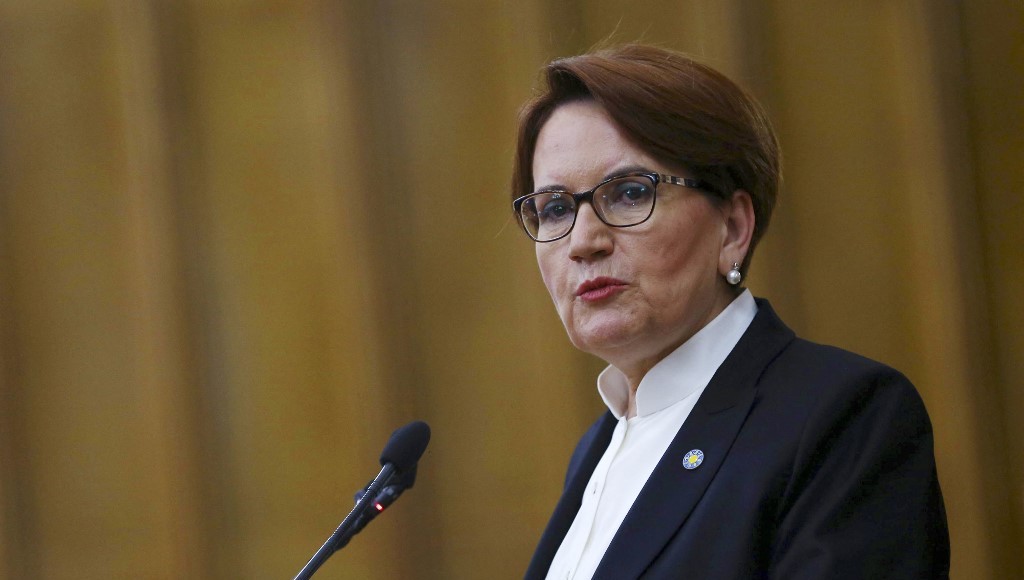Turkey’s nationalist opposition İYİ (Good) Party leader Meral Akşener has said the Supreme State Council should try four former Turkish ministers who were implicated in bribery and corruption in late 2013, local media reported on Friday.
“If we could set up an inquiry commission in parliament and have them send them [the four ex-ministers] to the Supreme State Council [for trial] as soon as possible, Turkey would finally [have a chance to] recover from a trauma it could never forget. If these people are [in fact] innocent, they will be acquitted,” Akşener stated in televised remarks early on Friday.
Turkey’s Constitutional Court also functions as the Supreme State Council to hear cases brought against the country’s highest officials for crimes related to their official duties.
The opposition leader’s statements came after Erdoğan Bayraktar, the former Turkish minister of environment and urban planning and one of the four ministers implicated in the 2013 probes, recently confirmed the validity of charges against him in connection with the graft scandal that had shaken the Turkish government to the core in 2013.
Bayraktar on Sunday revealed in an interview posted on YouTube that the evidence against him included in the case file of the December 17-25 bribery and corruption investigations was genuine and not doctored as alleged by the Justice and Development Party (AKP) government.
In the aftermath of Bayraktar’s remarks, Presidential High Advisory Board member Cemil Çiçek, also a former justice minister and parliament speaker from the ruling AKP, indicated that the case files of Bayraktar, ex-Economy Minister Zafer Çağlayan, ex-Interior Minister Muammer Güler and ex-EU Affairs Minister Egemen Bağış, who were implicated in 2013 graft probes, should have been seen by the Supreme State Council.
A 14-member parliamentary committee that included nine lawmakers from the ruling AKP and five from the opposition decided against the trial of the four former ministers by majority vote back in 2015.
Hakkı Köylü, the former head of the committee that was established by the Turkish Parliament to investigate the ex-ministers accused of bribery and corruption in late 2013, stated earlier this week that revisiting the probe might be discussed only if new evidence emerges, while many in Turkey argue Bayraktar’s confirmation of the authenticity of the evidence against him should be considered new evidence.
Underlining that recent statements of both Bayraktar and Çiçek regarding the 2013 probes were highly important, Akşener added that there was a great benefit in sending the cases of the four former ministers to the Supreme State Council to have them tried for bribery and corruption.
The graft scandal that erupted with the arrest of the sons of three then-ministers from the ruling AKP, Iranian-Turkish businessman Reza Zarrab, the director of a state-owned bank, a district mayor and many more on December 17, 2013, also implicated the children of then-prime minister and current President Recep Tayyip Erdoğan.
Despite the scandal resulting in the resignation of the cabinet members, the investigation was dropped after prosecutors and police chiefs were removed from the case. Erdoğan, officials of the AKP and the pro-government media have described the investigation as an attempt to overthrow the government.
Dismissing the investigations as a conspiracy against his government by the Gülen movement, a group inspired by Muslim cleric Fethullah Gülen, Erdoğan designated the faith-based movement as a terrorist organization and began to target its members.
He locked up thousands, including many prosecutors, judges and police officers involved in the investigation.
Bayraktar’s revelations came as a blow to Erdoğan’s claim that the corruption scandal was fabricated by sympathizers of the Gülen movement within the police department with the aim of overthrowing his government.
